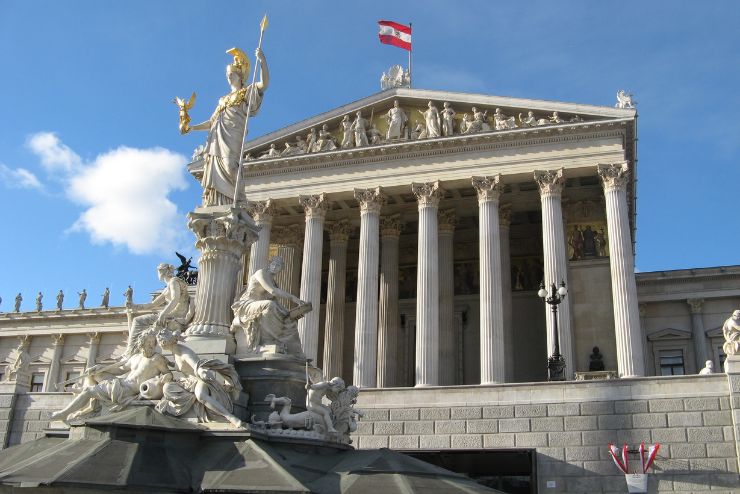Last Sunday, April 23, the right-wing, anti-globalist Austrian Freedom Party (FPÖ) scored the best result in its history in the state election in Salzburg, the largest of Austria’s nine autonomous states.
The results show that the Austrian people, often characterized historically as laid-back and easygoing, are becoming vigilant against the two greatest perils their country faces: immigration and the overbearing behemoth of the European Union, which is getting ever more insane and wicked with each passing day.
Since the late 1700s, Austria has enjoyed the legendary reputation of being a second land of the Phaeacians, who appear in The Odyssey as a rapacious, pleasure-loving people living off the edge of nowhere. As such, the Phäaken seemed to Friedrich von Schiller a perfect metaphor for the denizens of the Habsburg ancestral lands:
Mich umwohnt mit glänzendem Aug’ das Volk der Phaiaken;
Immer ist’s Sonntag, es dreht immer am Herd sich der Spieß.
(The people of the Phaiacs live around me with shining eyes;
It’s always Sunday, the spit is always turning at the stove.)
Even the political and social upheavals of the post-Joséphine era, which culminated in the Napoleonic Wars, had not changed the Austrian cheerful view of life, as depicted in Franz Grillparzer’s Ottokar once the storm was over. After paying homage to his native land’s beautiful landscape, he says:
D’rum ist der Österreicher froh und frank,
trägt seinen Fehl, trägt offen seine Freuden.
Beneidet nicht, lässt lieber sich beneiden!
(That’s why the Austrian is happy and frank,
bears his mistakes, bears his joys openly.
Don’t envy, prefer to be envied!)
Over a century later, in 1929, in his famous “Speech About Austria,” the poet and playwright Anton Wildgans accepted that Austrians are indeed Phäaken. “Our country, graced with all of God’s wonders of beauty and inhabited by friendly people, continues to be an island of song and of the noble cheerfulness and the courageous emotion of human hearts,” Wildgans said. “In this sense we Austrians want to be and remain Phaeacians.”
To the Austrian Wildgans, the utter seriousness that his German neighbors showed in the treatment and settlement of problems big and small was alien. Wildgans and his countrymen had a nose for finding humor in the pathetic and ridiculousness in the overly self-confident.
To this day, the majority of Austrian people retain the talent to win the bright side of existence, the tendency to take the difficult lightly. Crossing from Switzerland or Germany, even though the landscape doesn’t change, one is filled with a sense of cheerful well-being when hearing the Austrians’ regional greeting, Grüß Gott! Admittedly, these pleasant qualities manifested themselves at times as a willingness to let things go as they go; and, at worst, as an indolence, a willful belittlement of peril so as not to be bothered by the problem of how to avert it.
This time, mercifully, the indolence is gone: many Austrians seem to be aware of the need to protect themselves from those twin mortal threats to their identity and their way of life: immigration and the EU. This was manifested in the FPÖ’s victory in Salzburg.
The establishmentarian center-right Austrian People’s Party (ÖVP) of current Chancellor Karl Nehammer still secured the largest section of the popular vote, but its total fell more than seven percentage points from its 2018 results, to 30.4 percent. The FPÖ was the clear winner, overcoming the socialists to become the second strongest party, rising to 25.7 percent of the vote, from 18.8 percent previously.
Perhaps even more significantly, according to the latest national polls the Freedom Party is the strongest party in the country at 28 percent, with a continuing upward trend. Last January, the FPÖ won 24 percent in the state of Lower Austria. (Interestingly, for the first time in over seven decades the Austrian Communist Party entered the Landtag with 11.7 percent of the vote.)
As The European Conservative’s Robert Semonsen points out, in addition to its Euroscepticism, the FPÖ is the only party currently represented in the Austrian Parliament that opposes economic sanctions against Russia. It was also the only major party to oppose the government’s draconian lockdown regime and mandatory COVID-19 vaccinations. And of course, the FPÖ is the country’s only party that has—over many years—consistently sought to enact radical changes to stop illegal mass migration.
FPÖ leader Herbert Kickl declared after the election that the next step “is a run for the chancellery and a government under FPÖ’s leadership.” This seems by no means an unrealistic objective when the next national election comes in the fall of 2024. The FPÖ is back, fully recovered, four years after the German media published a secretly recorded video of then-Party leader Heinz-Christian Strache on the island of Ibiza, in which he was purportedly discussing a business arrangement with a woman he believed was connected to a Russian oligarch.
The “Ibiza affair” brought down the government in which the FPÖ was a coalition partner and led to snap general election in which the party dropped ten percentage points to just 16 percent.
The FPÖ’s obituaries, which the mainstream media gloatingly published at the time, are now proven to have been somewhat premature.
It’s been over two centuries since Schiller–German by accident, pan-European by conviction–wrote that der Österreicher hat ein Vaterland Und liebt’s und hat auch Ursach’, es zu lieben. (“The Austrian has a fatherland, and loves it, and also has reason to love it”). As luck would have it, and as last Sunday’s Salzburg election clearly indicates, this is still true. It has been said that Austrians are as German as the Danube is blue. In one important sense this is true: Germany seems hopeless, but this Alpine redoubt still holds.

Leave a Reply